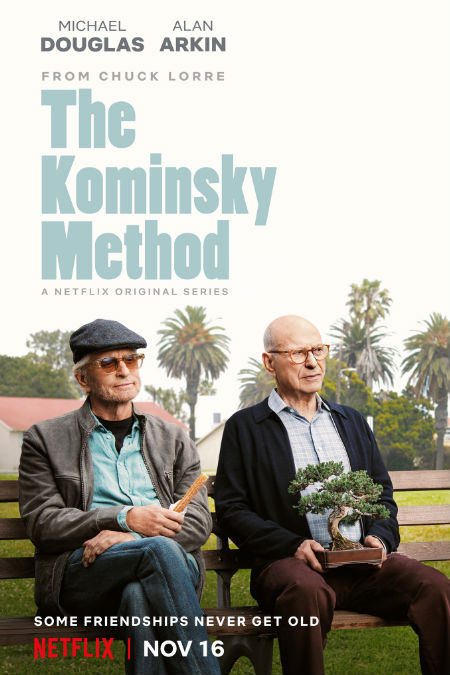
Let’s be honest – growing old doesn’t look like a whole heap of fun.
Sure you have the wisdom of all those hopefully-happily accumulated years, a nice line in public transport discounts and the time to shop for all those bargains that evade the more time-pressed of us.
But there are downsides, such as death of friends and loved ones (hopefully not yourself), the effects of past mistakes, whether personal, financial or professional, coming back to haunt you and the unnerving sensation that your body spends its off-hours coming up with new and ingenious ways to flush its usability down the sink.
All these aspects of growing old and more are explored in The Kominsky Method, a 8-episode series recently-released on Netflix, which explores the lives of two old friends (both in age and longevity of their friendship) who are finding that, far from supping of the fruits of a long-lived life, their lives are not quite what they signed for.
Revered acting coach Sandy Kominsky (Michael Douglas), whose acting career didn’t quite work out as planned but who’s found his services as an expert on all things thespian very much in demand, and Norman Newlander (Alan Arkin), one of the big gun coaches in Hollywood, are at the stage in life where all the aforementioned issues with growing older are coming to roost with a vengeance.
Sporting a tone that is far more serious than you might expect from the trailer, The Kominsky Method grapples with everything from the death of Norman’s wife of 40-plus years (in the first few episodes, so no gradual build-up here) to Sandy’s rather lackadaisical approach to the business side of his acting academy (to the chagrin of his devoted but long-suffering daughter Mindy played by Sarah Baker) and thousand small and big issues in-between.
If the fact that Chuck Lorre is behind the show puts you off somewhat, rest assured that The Kominsky Method occupies a far more considered space than sitcoms like The Big Bang Theory.
In overall tone it is more akin to Lorre’s Mom which is prepared to go deep and dark in pursuit of its unflinching narrative although it occupies a far more insightful place than even that well-regarded sitcom.
The thing is, Lorre has always swung behind cheap laughs and more-thoughtful efforts, so the fact that The Kominsky Method hails from his creative hands actually makes perfect sense.
You only have to read his end credits to know that Lorre is an intelligent man whose eyes for the whims and foibles is as sharp as anyone’s; the fact that it is often delivered via sitcom in no way diminishes what he’s trying to say.
In fact, by going far more serious than slapstick on The Kominsky Method and being willing to depict the excoriating effects of grief – the scenes where Norman has to confront the fact that he’ll never see his wife, Eileen (Susan Sullivan) again are incredibly moving and beautifully, touchingly executed – the emotional intelligence that sits behind much of Lorre’s work is on full and pleasing display.
Sure there are visual jokes aplenty about the perils of taking a piss in your date’s frontyard – Sandy starts dating Lisa (Nancy Travis) a middle-aged divorcée right about when his prostrate is getting bigger and squeezing his bladder – and how you deal with a junkie daughter (Norman’s daughter Phoebe, played by Lisa Edelstein) who is in rehab for the eighth time and most definitely doesn’t want to be there.
Both of these scenes and more are outright, laugh-out-loud funny but rather than playing as cheap laughs, they fit beautifully into the overall look and feel of the show because it goes to so much trouble to set the scene and establish the characters of Sandy and Norman as two very competent men who, like most of us, do not have all their shit together.
It would have been incredibly easy to play them for cheap, clown-ish laughs, portraying them as incompetent fools pissing merrily on everything they touch.
Instead, Lorre wisely makes them both good at their jobs and life in general, but as clumsy with the finer points of human interaction as any of us, something that makes them relatable purely because we all inhabit a world where most people are able to function well in most spheres but, and this is the space The Kominsky Method winningly-inhabits, not all.
Hence while Norman is a stellar agent and a good and loving husband, his relationship with daughter leaves a great deal to be desired; similarly Sandy, while successful as an acting coach and close to his daughter Mindy, is continually falling down on the romantic front, meaning his relationship with Lisa hits more potholes than a car on a poorly-maintained country road.
If these two linchpin characters has been rendered as court jesters eternally and wholly fumbling their way disastrously through life then any emotional resonance would have been largely lost.
Sure, we’d have laughed but for how long and deeply and what kind of impression would have been left behind?
Not much of a lasting one I’d wager and it’s this willingness to play the characters straight and much of the narrative they inhabit, that makes The Kominsky Method such a sustained pleasure to watch.
Yes, it’s funny and often wryly and uproariously so, but it is also thoughtful, meaningful and packs a solid emotional punch that never feels staged and always comes across as something real, and that marks The Kominsky Method as something that’s a cut above your average sitcom, a rare comedy show that isn’t afraid to get down and get serious in the messy business of living at the few minutes to midnight stage of your life.